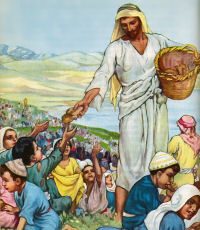» Enjoy our Liturgical Seasons series of e-books!
"And I tell you, ask and you will receive; seek and you will find; knock and the door will be opened to you. For everyone who asks, receives; and the one who seeks, finds; and to the one who knocks, the door will be opened (Luke 11:9-10)."
Today is the feast of St. James which has been superseded by the Sunday liturgy.
Sunday Readings
The first reading is taken from the book of Genesis, 18:20-32. Last week we heard of Abraham's encounter with the three visitors and the promise of a son. Today we hear of Abraham's bargaining with God over the fate of Sodom.
The second reading is from the letter of Paul to the Colossians, 2:12-14. To better understand today's reading, it is necessary to back up one verse: "In him also you were circumcised with a circumcision made without hands, by putting off the body of flesh in the circumcision of Christ." The "circumcision of Christ" to which Paul refers is baptism. In the Old Covenant, the rite of initiation into God's family was circumcision. In the New Covenant, this same rite of initiation is baptism. In the Old Covenant, the mark was on the physical body but under the New Covenant, the mark is placed on the soul.
The Gospel is from St. Luke, 11:1-13 in which we hear Luke's rendition of the "Our Father" and Jesus' teaching on prayer.
The Our Father is certainly the most sublime formula possible and contains the whole essence of the most elevated mental prayer. However, Jesus gave it as a formula for vocal prayer: " When you pray, say. . . " (ibid. 11:2). This is enough to make us understand the value and importance of vocal prayer, which is within the reach of everyone even children, the uneducated, the sick, the weary.... But we must realize that vocal prayer does not consist only in the repetition of a certain formula. If this were true, we should have a recitation but not a prayer, for prayer always requires a movement, an elevation of the soul toward God. In this sense, Jesus instructed His disciples: "When thou shalt pray, enter into thy chamber, and having shut the door, pray to thy Father in secret.... And when you are praying, speak not much as the heathens" (Mt 6:6-7). It is interesting to note that in St. Matthew these prescriptions concerning the exterior and interior dispositions necessary for well-made prayer immediately precede the teaching of the Our Father.
Therefore, in order that our vocal prayer be real prayer, we must first recollect ourselves in the presence of God, approach Him, and make contact with Him. Only when we have such dispositions will the words we pronounce with our lips express our interior devotion and be able to sustain and nourish it. Unfortunately, inclined as we are to grasp the material part of things instead of the spiritual, it is only too easy in our vocal prayer to content ourselves with a mechanical recitation, without taking care to direct our heart to God; hence we should always be vigilant and alert. Vocal prayer made only by the lips dissipates and wearies the soul instead of recollecting it in God; it cannot be said that this is a means of uniting us more closely to Him.
— Divine Intimacy Fr. Gabriel of St. Mary Magdalen, O.C.D.
Things to Do
- Today marks the middle of Ordinary Time (33 weeks total). There are 5 months until Christmas and 4 months until the new Church year beginning in Advent. Put some time aside to do inventory and planning. Obtain a copy of a calendar for the upcoming year (if you have children, look at the upcoming school year beginning in August or September). Decide what feasts will be focused on during the year (family patrons, favorite feast days, feasts related to projects for the year). Also consider what kind of focus will be used for the different liturgical seasons. This of course can change, but it's good to plan a little. Perhaps focus the year on a certain virtue or theme or symbol. An example would be how does the light symbolism play into the liturgical seasons and feasts? Then, with each season, examine this and implement projects that focus on the light theme, such as candles.
- Take an inventory of books and craft supplies for the upcoming seasons, including kitchen items, like food coloring, cookie cutters, cake pans, icing tips, etc. Holycards or pictures or statues of patron saints, feast days are good decorations. What about tablecloths or placemats or napkins in liturgical season colors? Do you want to incorporate a special plate for birthdays and namedays? This would be a good time to start or plan projects like these. Plan a budget of liturgical supplies, books, materials and a loose time-line of projects. If you are homeschooling, projects could be integrated with the school material. (JGM)






